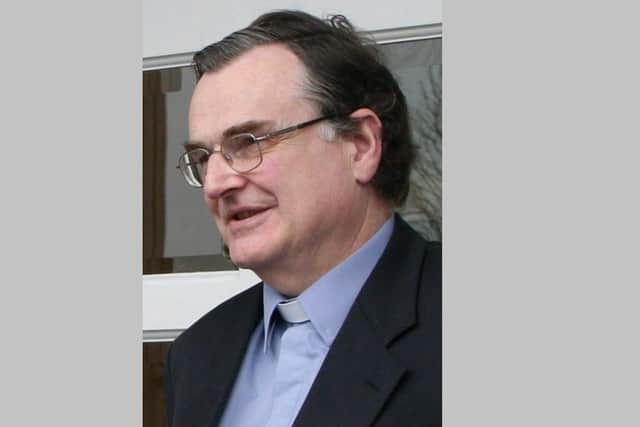Canon Ellis: Purpose in life is one of the many ingredients that make for happiness


Of course, the American Declaration of Independence upholds “life, liberty and the pursuit of happiness” as an inalienable right.
It has been suggested that the pursuit of happiness here refers not so much to a striving after happiness as to the possessing and enjoyment of it, as in the sense of ‘pursuits’ more generally.
Advertisement
Hide AdAdvertisement
Hide AdWhile everyone is entitled to seek happiness, and while one naturally would want everyone to be happy, whether people have an actual right to be happy is perhaps a different matter.


Then again, there can be degrees of happiness, ranging from the delirious to simple contentment, the former seldom lasting for long and the latter typically being much more enduring.
At this season of weddings, the newly married are extended many good wishes for a long and happy life together. Indeed, what more could one ask for?
Happiness is perhaps most important in family life, because being happy with those who are closest to us provides a sense of comfort and security. It is, moreover, vital for children if they are to become well-adjusted adults.
Advertisement
Hide AdAdvertisement
Hide AdSadly, for whatever reasons, many marriages descend into desperate unhappiness and the result surely cannot be good for anyone. Yet, hopefully, with help and support, a renewed happiness can be found, but in such circumstances it requires much inward effort along with a realistic and mature outlook to rebalance things and to find a lasting contentment despite whatever the trouble has been.
Such is what an ancient prayer for those in distress describes as “a happy issue out of all their afflictions”.
The Bible speaks about happiness, mainly understanding it in terms of joy and blessedness. Happiness here is not fleeting but lasting. It is also portrayed in terms of the well-being that contrasts with adversity and of the hope that affliction can be turned around. The Psalmist declares that “weeping may endure for a night, but joy comes in the morning” (Psalm 30: 5).
In a recent book entitled, The Science of Happiness, psychiatrist Professor Brendan Kelly of Trinity College Dublin points out that both religion and politics have a similar positive impact on the individual in terms of happiness, not least because they are both about belief in something, be it a theological creed or a political philosophy.
Advertisement
Hide AdAdvertisement
Hide AdIndeed, he considers six “principles of a happy life”, as well as strategies for achieving it.
The six principles considered are: balance (notably simplicity and moderation), love (happiness being its “net result”), acceptance (such as the Serenity Prayer’s principle of accepting what cannot be changed and having the courage to change what can), gratitude (for what we are and have), avoiding comparisons (with others), and believing (in something at least).
Yet strangely, while religion is seen to have generally beneficial effects, according to Professor Kelly this holds true only in terms of the individual. He comments on recent research that has found “secular countries appear to have greater well-being than religious countries”. One explanation offered for this paradox is that religious belief can at times lead to intolerance.
Religion of course does not always make people happy, due to its emphasis at times on guilt and exclusion, as Professor Kelly has indicated.
Advertisement
Hide AdAdvertisement
Hide AdYet, the term ‘religion’ is a very wide concept. There are different types and styles of religion with some being more conducive to harmony than others.
In short, we should take great care with our religion and our politics. Both are powerful influences and need to be channelled in good ways if they are to be truly beneficial to individuals and to societies in terms of engendering happiness.
Purpose in life is surely one of the many ingredients that make for happiness. Work in itself can be immensely rewarding or pure drudgery or something in between. Yet the purpose of work can bring a reward that is distinct from the work itself, the fulfilment of some goal, not least the provision of the basic needs of life for oneself or one’s family.
The sense of purpose that promotes contentment need not be work, however. It could be simply dedication to the service of others in particular ways or to following a religious faith or philosophy of life.
Advertisement
Hide AdAdvertisement
Hide AdThe world in which we live is suffering in many ways. From political impasses to natural disasters to poverty to the cruelty people often mete out on each other to outright warfare, there is no shortage of things to make people unhappy or even to question whether there is purpose to it all in the first place. Indeed, just thinking about happiness may seem out of place when there is so much tragedy all around.
Yet, happiness in the best sense – lasting contentment or, from a religious perspective, blessedness – is a good goal for all. Found in the deeper things of life, lasting happiness buoys people up and is worth keeping to the fore amidst so much else that would draw us down.
• Canon Ian Ellis is a former editor of The Church of Ireland Gazette
• Owen Polley is on holiday